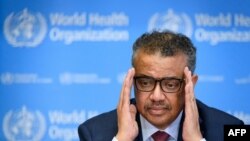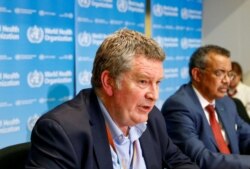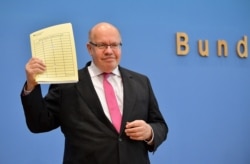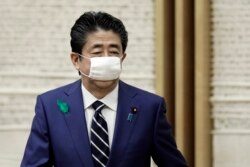World Health Organization Director-General Tedros Adhanom Ghebreyesus said Wednesday his agency acted “quickly and decisively” in its response the new coronavirus.
His defense of WHO came in response to mounting criticism, particularly from the United States, the agency’s top donor and the world leader in coronavirus infections and deaths.
“From the beginning, the WHO has acted quickly and decisively to respond to warn the world,” Tedros said during a media briefing in Geneva. “We sounded it early, and we sounded it often.”
Tedros said the WHO, which on Jan. 30 declared COVID-19 a global emergency, has trained 2.3 million health care workers and shipped millions of test kits worldwide.
WHO emergencies expert Mike Ryan told reporters the agency was planning to ship a large number of additional test kits to less-wealthy countries.
The U.S. has more than 1 million confirmed cases, nearly one-third of all cases worldwide, and that number is likely to grow in the months ahead, according to U.S. infectious disease expert Anthony Fauci, who has warned that a second wave of infections in the country is “inevitable.”
“It’s not going to disappear from the planet, which means as we get into next season … in my mind, it’s inevitable that we will have a return of the virus, or maybe it never even went away,” Fauci said Tuesday. He said when the second wave comes, “how we handle it will determine our fate.”
The pandemic is taking a heavy toll on the global workforce. Half of the world’s employees is at risk of losing their incomes, the International Labor Organization said Wednesday.
“We all know that the informal economy, where about six out of 10 working people in the world make their living, is synonymous with unprotected work, precarity at work. So, it is important that we see what is going in this most vulnerable part of the global labor market,” ILO Director-General Guy Ryder said Wednesday in Geneva.
Ryder said there are 2 billion informal workers — employees with little or no job security — worldwide. Of those, some 1.6 billion have had their chances to earn a living dramatically reduced “because of the current COVID-19 crisis."
Manufacturing is one sector that many governments are turning to as they lift restrictions on businesses to put people back to work and restart economies.
Several German automakers have restarted production with social distancing measures in place. The country has started other aspects of its emergence from lockdown, including opening stores, but starting Wednesday, people must wear face masks to enter shops.
"We all need to take care that we don't end up with more infections," said Lothar Wieler, president of Berlin's Robert Koch Institute.
European aviation firm Airbus said Wednesday the industry is in a grave crisis because of the coronavirus pandemic and that it will take time to restore people’s confidence in air travel.
Air traffic has dropped significantly with the combination of travel bans and people opting to stay home to prevent the spread of the virus.
Airbus said it lost $522 million in its first quarter as it put thousands of workers on furlough and delivered 40 fewer aircraft than the same period last year.
South Korea is urging people to wear masks as they travel for a long holiday weekend to maintain gains the country has made in stopping the spread of the virus.
Health officials reported just nine new cases in South Korea on Wednesday, bringing the country’s confirmed total to 10,761.
In Japan, Prime Minister Shinzo Abe gave the latest official doubts about the Tokyo Olympics, which organizers pushed back one year after determining there was no safe way to hold the games starting in July.
"The Olympic Games must be held in a way that shows the world has won its battle against the coronavirus pandemic," Abe told Parliament.
His comments came a day after the head of the Japan Medical Association said it would be difficult for Japan to host the Olympics unless there is a coronavirus vaccine available to the public.
There are more than 3,100,000 COVID-19 cases and over 224,500 deaths worldwide, according to John’s Hopkins University statistics on Wednesday.








